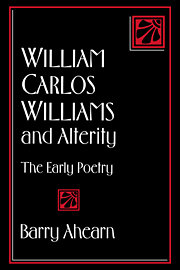6 - Fragments Shored
Published online by Cambridge University Press: 05 January 2012
Summary
An appreciation of rhythm in Williams that does justice to the topic must initially discriminate among various types of rhythm. Other critics have explored the relation between traditional meters and free verse in Williams, and in the middle of this chapter I do consider Williams's use of the trochee. But the greater part of this chapter is concerned with a more elusive kind of rhythm, one not easily defined. The rhythm we are concerned with now is discernible in patterns of divergence, evasion and control within the poems. It is the rhythm, we might say, resulting from conflicting centrifugal and centripetal tendencies. To put it another way, we are examining a rhythm that grows from Williams's handling within the poem of tendencies toward dissolution (the “Hydean” element) that are counteracted by patterns that restrain and synthesize (the “Jekyll” side of the poem). As with other aspects of the poems we have reviewed, the interest of these contradictory movements is partly in their very presence, partly in their contribution to the poems' meanings. But some demonstrations are in order.
“Primrose” (CP1, 161–2) is remarkable for its lack of attention to primroses. It uses the plant simply as a point of departure. Near the end of the poem (ll. 24–8) we are allowed a brief glimpse of a primrose, but the poem then shifts to sketching a landscape for its conclusion.
- Type
- Chapter
- Information
- William Carlos Williams and AlterityThe Early Poetry, pp. 135 - 153Publisher: Cambridge University PressPrint publication year: 1994



